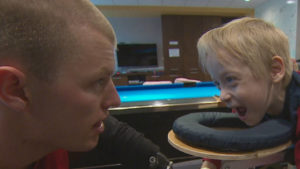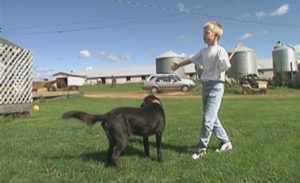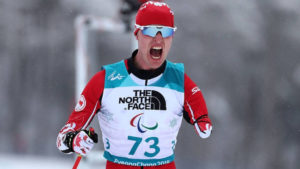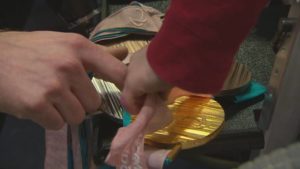Canadian flag-bearer makes a trip home to the Maritimes to visit the children’s hospital

When Paralympian Mark Arendz approaches, four-year-old Elliot Little is immediately enamoured with the athlete’s medals, his tiny fingers wrapping around them as Arendz explains he won them in biathlon and cross-country skiing in Pyeongchang.
“I made medals, too!” the child exclaimed. He had won an air hockey game at the IWK Children’s Hospital in Halifax, where he was undergoing a procedure to improve his quality of life with cerebral palsy.
Just a few minutes later he noticed the athlete’s arm and reached out to grab it.
“Why do you got a hook on you?” he asked in that blunt way only a child would.
“Because I don’t have my hand,” says Arendz.
“Where’s your hand at?” Elliot persists.
“I lost my hand in an accident,” Arendz explains ever so patiently.
The accident
Arendz fell into a grain auger on the family farm on Prince Edward Island when he was seven. He tried to use his hands to catch his fall.
“Only being seven, it kind of went right through, and instantly I was stuck up to my shoulder in the machine,” he explained recently from his parents’ home in Hartsville, P.E.I.

Arendz was airlifted to IWK, where his arm was amputated.
“The first night, I wasn’t even concerned about his arm because at that time his life was in danger,” said his mother, Janny Arendz.
Her son would not only survive but thrive.
A month after his accident, Arendz was back outside running and playing. At that time, his greatest obstacle was tying his shoes. He wore the kind with Velcro closures for a year — until he was inspired by another child with one arm.
“A little girl with a pink dress and pink shoes,” his mother vividly recalls. “This particular girl tied her shoes, and something happened in Mark, I think. He was so determined that he wanted to tie his shoes too.”
Two days later, he could. His parents took him shopping for shoes with laces.
It was, perhaps, the first example of his conviction when it comes to setting goals.
Dreaming big and chasing goals
He would go on to be a War Amps volunteer and a biathlete, first with the Cadets, competing nationally against able-bodied athletes before reaching the Paralympics in Vancouver in 2010.
That’s where a childhood dream to be among the best in the world became a realistic target. He didn’t make that target, but he came a little closer in Sochi 2014, missing gold by 0.7 of a second. He left with a silver and a bronze medal.
It all came together in Pyeongchang, where Arendz competed six times, medalling in every event — more than any Canadian has ever achieved in a single Winter Games. His historic performance, including one gold, earned him the position of Canada’s flag-bearer for the closing ceremonies.
At 28, he was on top of the world.

Now living in Canmore, Alta., he came back to the Maritimes to share his success with the people who saved his life.
“It’s heartwarming. It’s wonderful. It was like they were just here,” said Jennifer Muirhead, who has been a nurse at the IWK Health Centre since Arendz was a child. “It’s nice to know that you’ve made that connection with a family and 21 years later you still have it.”
For Arendz, it’s the connection with the children that matters most. He toured the hospital, taking time to answer as many questions as the kids could ask.
“It was awesome! I got to hold the medal and I found it really cool. It was a special treat. It really was,” said 11-year-old Eli Rowe, here recovering from a ruptured appendix.
For Arendz, medals smeared with children’s fingerprints, the ribbons worn and tattered from being handled, mean he’s done something right.

“I want as many people as I can to hold them, and in that moment be inspired to do whatever they want to do,” he said.
He also visited schools in P.E.I and spends his time volunteering in various ways. He says it was the accident that taught him the importance of community.
“The day after my accident, 12 strangers came to the farm, and some had never stepped foot on a farm, and they just wanted to be there to help,” he said.
His parents couldn’t be more proud.
“It’s very important to us that that defines him as a human being, and not just being an athlete, getting medals,” said his mother, fighting back tears.
As he continues to inspire the next generation to dream big and chase goals, Arendz has already set another goal of his own.
He’s circled the date on his calendar for Beijing 2022.
“Only 1,400 more days,” he jokes to the sick children gathered around him at the hospital, and everyone laughs.


